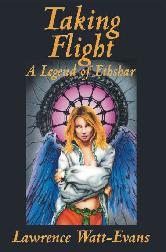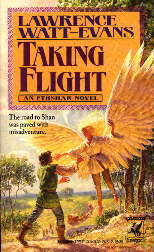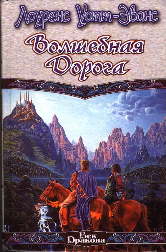
A Legend of Ethshar
Taking Flight was the fifth novel to be published in the Ethshar series, but it's not fifth in internal chronology, and it was fourth in the Wildside series of reprints. It's the story of a young man who sets out in pursuit of fortune and adventure, and becomes involved with a mysterious winged girl.
It's not a grand epic, nobody saves the world, but there's both more and less to Irith the Flyer than is immediately apparent.

.
| Cover Gallery |
|---|

|
| The Wildside edition
|

|
| The Del Rey edition
|

|
| The Russian edition |
Taking Flight
by Lawrence Watt-Evans
Prologue
 he girl squirmed on her seat, and the old woman cast her a quick, angry glance. She quieted, and the woman turned back to her customer.
he girl squirmed on her seat, and the old woman cast her a quick, angry glance. She quieted, and the woman turned back to her customer.
"Well, lad," she said, "What would you have of me?"
The boy hesitated.
"I'm... I'm Kelder of Shulara," he said.
"I know," she replied, nodding.
It was a lie, of course; she hadn't known anything of the sort. In fact, it struck her suddenly that the name might be false, and instead of looking omniscient she might look foolish if she believed it. "Kelder of Shulara" -- well, really, that probably was a lie! And not a very original one, at that. Smoothly, so that the boy saw no pause, she winked at him and continued, in a mysterious tone, "I know all I need to know."
The lad looked suitably confused and impressed. Behind him, the little girl rolled her eyes upward and mouthed something -- it looked like, "Oh, come on, Grandma!"
"So, Kelder of Shulara," the woman went on, a bit hurriedly, "You have come to Zindre the Seer to learn your future -- and I see it laid out before me, vast and shining. There is too much to tell you all of it, my child, for your life will be long and rich; you must ask me specific questions, and I shall answer them all..."
The girl cleared her throat. Her grandmother glared at her and continued, "...at the cost of merely three bits apiece."
Kelder, fortunately, didn't notice any of the byplay between Zindre and her granddaughter; he was staring intently at the crystal bowl on the table before him, as if he expected to see something in it himself.
That was an uncomfortable thought; Zindre did not like the idea of a customer who had real magic.
But surely the boy couldn't have any magic; he was just a peasant.
He cleared his own throat, and asked, "Will I ever get out of Shulara?"
That was an easy one. "Oh, yes," Zindre said. "You shall go, and you shall go far, beyond the hills and into strange lands, and you shall return safely." He probably wouldn't, but she knew what he wanted to hear.
"Return? I'll come back?"
Zindre suppressed a frown and silently cursed herself for not listening more carefully to the boy's tone and phrasing. "Oh, yes," she said, "You will return, covered in glory, to tell those who remained behind of the wonders you saw."
"To stay?" Kelder asked; then something registered, and without waiting for an answer he asked, "Wonders? What wonders?"
"Many wonders," Zindre said quickly, hoping to distract the boy from the question of exactly where he was going to wind up. "Great cities and vast plains, strange beasts and beautiful women, and much mighty magic." She usually threw in something about mountains, rather than plains, but in a place as hilly as Shulara she thought that plains would be more exotic and intriguing.
"Magic? But what will I do? Where will I go?"
Zindre gestured broadly and stared into the bowl before replying, "The magic is strange, of a kind I have never seen, and that neither wizards nor witches know. It will both be yours and not be yours. You will roam free, unfettered, and you will be a champion of the lost and forlorn, honored by the dead and those yet unborn." That should sound vague and mysterious enough to suit anyone.
From the corner of her eye she saw her granddaughter clearly signing to ease up a little; Zindre reviewed what she had just said and decided the girl was right, she had been getting carried away. "As for where," she said, "I see a long road stretching before me, but just which road it might be I cannot say."
Kelder's disappointment showed on his face. The granddaughter broke in.
"Excuse me," she said, "But that makes fifteen bits, and you only paid a single round; I'll need another before you ask my grandmother any more questions."
Kelder turned, startled, and stared at her, open-mouthed.
She held out a hand.
Abashed, Kelder dug in the purse at his belt and pulled out another copper round. "That's all I have," he said.
"That leaves one bit," the girl said, "Do you want change, or one more question? My grandmother will answer one more at discount."
"Another question," Kelder said immediately.
"Think well before you speak, then, Kelder of Shulara," Zindre intoned.
Kelder thought.
"Tell me about the girl I'll marry," he said at last.
Zindre nodded. "She will be bright and beautiful, with a laugh like birdsong," she said, "With a magic all her own. You will bring her to your home in pride and delight, and spend your life with her in joy." That one was easy; it was a standard question, and she had used that standard reply a hundred times, at least.
"Children?" Kelder asked.
"Money?" the granddaughter demanded.
Woebegone, Kelder admitted, "I don't have any more."
"It matters not," Zindre said quickly, "The vision dims; the spell is fading away. I could tell you little more in any case." She picked up a green cloth and dropped it neatly over the crystal bowl.
"Oh," Kelder said. Reluctantly, he stood.
The granddaughter gestured toward the door of the hut, and Kelder, with a polite little bow, departed. The girl escorted him out, and closed the door behind him.
When the door was shut the girl said, "I guess he believed it."
"Of course he did!" said Zindre, bustling about, adjusting the hangings on the walls and straightening candles that had slumped as the wax melted unevenly. "Are there any more?"
"No," the girl said. "You know, Grandma, I still don't understand how we can get away with this -- can't anybody tell real magic from lies?"
"Those that can," Zindre said complacently, "don't come to us in the first place."
Outside, in the gathering dusk, Kelder found two of his sisters chattering with the smith's daughter, near the forge. "Where have you been?" Salla demanded, as her little brother ran up.
"Talking to the seer," he said.
All three girls turned to stare at him. "Oh, Kelder, you didn't," Edara said.
"Didn't what?" Kelder asked defensively.
"You didn't spend all your money on that charlatan!"
"No, I didn't!" Kelder replied angrily.
"How much did you spend?" Salla asked.
"Not that much," he said.
"How much?"
"Two rounds," he admitted.
"Oh, Kelder!" Edara sighed.
"Magic is expensive!" he protested.
"Kelder," Salla told him, "she doesn't have any more magic than I do! She's an old fake! A liar!"
"No, she isn't!"
"Yes, she is! She's here every year, and none of her predictions have ever come true."
"Not yet, maybe," Kelder said.
"Never, Kelder. She's a fake. None of what she told you is going to come true."
"Yes, it will," Kelder said. "You just wait and see!" He turned away, hurt and angry, and muttered to himself, "It will come true."
A moment later he added, "I'll make it come true."
Click here to return to the top of the page 

Origins
Back in the very late 1970s or very early 1980s, I happened across three images in succession that I associated with one another, and which collectively fascinated me.

One was the cover art to Piers Anthony's novel Hasan, based on a story from The Thousand Nights and A Night; the cover showed a bird-woman in mid-transformation. (This was, I'm fairly sure, the 1979 Dell edition; I think the cover's by Don Maitz.)
Another was the cover art for the Jefferson Starship album Dragonfly, credited to Peter Lloyd -- that's from 1974, but for some reason I came across it later than that, presumably in 1979.
And the third was an ad in TIME for some major corporation, I think an oil company, bragging about its support of young artists through a foundation of some sort. The ad was captioned "The Young Must Try Their Wings," and had artwork similar in concept to Peter Lloyd's album cover.
The idea of people with wings is hardly new, of course, but I like it very much indeed; I used to love the old X-Men comics largely because of the Angel, a guy with wings, for example.
However, running into those three images very close together in time (possibly the same day) made something click, and I became determined to write a novel about a girl or young woman with wings.
I didn't get to it for a few years, though. I was busy with other stuff. I did, however, start working out just who Irith the Flyer was, how she became what she is, and so on.
And when I started putting together the Ethshar series proposal, I realized that here was where Irith belonged. I plotted out the novel and included the outline with the series proposal.
Lester del Rey bought the series, but he didn't want that particular novel. Instead he picked The Misenchanted Sword first of the five or so proposed stories.
Then he chose With A Single Spell as the second.
And The Unwilling Warlord third.
By this time I was eager to write The Young Must Try Their Wings (the title came from that ad, of course, but also reflected the whole theme I wanted to write about) and made this plain to Lester.
He didn't care. He didn't like the outline for The Young Must Try Their Wings, and said so. He made it quite clear that it was too small a story, it didn't have the scope, the importance, that a fantasy novel needed to be commercially successful.
While I acknowledged that this was probably true, I didn't give a damn. I wanted to write it. I thought it would be a beautiful little story, and didn't care about the fact that it would be "little."
Lester cared, though, and wouldn't buy it. Instead he convinced me to write The Blood of A Dragon.
I wasn't happy about the way that one turned out.
It was at about this point that Lester got horribly backlogged on everything. His wife Judy-Lynn, who had run Del Rey Books, had died early in 1986, and without her to push him and keep him on task Lester got progressively further and further behind on everything he did. By 1990, when I turned in The Blood of A Dragon, he was well over a year behind schedule.
So rather than wait for him to look at any proposals, I concentrated on stuff for other editors -- such as the Three Worlds trilogy (a.k.a. Worlds of Shadow). I submitted the proposal for The Spell of the Black Dagger, but while I was waiting for him to read it, and while I was waiting for Owen Lock and my agent to reach a deal (or fail to) on what became the Three Worlds trilogy, I went ahead and wrote Taking Flight.
And I turned in the complete novel without a contract. I half expected him to reject it, and the not-yet-written The Spell of the Black Dagger with it, which would have meant taking the Ethshar series to another publisher, such as Bantam or Tor.
But he bought them both. He said he still didn't think much of Taking Flight, but his assistant liked it, and it didn't totally suck, so he bought it and Del Rey published it.
They took so long to do so, though, that by then Lester had been retired from Del Rey and I'd written The Spell of the Black Dagger. The two books came out just a few months apart.
I like Taking Flight very much; it's one of my favorites in the series, scope or not. That Lester didn't like it never bothered me; Lester's tastes were always eccentric, and there's a famous anecdote about how a novel he had vehemently rejected won a major award, after garnering great critical acclaim and commercial success. Lester was at the awards ceremony and congratulated the author, then told him, "But it's still a lousy novel."
I think of Taking Flight as another one that fell in one of Lester's blind spots.

Publishing History
- Copyright 1993 by Lawrence Watt Evans
- First edition mass-market paperback published March 1993 by Del Rey Books, ISBN 0-345-37715-X, with cover art by Tim Hildebrandt.
- Second edition trade paperback published May 2001 by Wildside Press, ISBN 1-58715-288-6, with cover art by Dalmazio Frau . This edition includes a bonus short story, "Night Flight."
- Current e-book edition was released February 2015 by Wildside Press
- AST published a Russian edition in 1999, ISBN 5-237-03388-1, under the title Volshyednaya Doroga ("Magical Road"), translated by Viktor A. Veber.
Click here to return to the top of the page 


